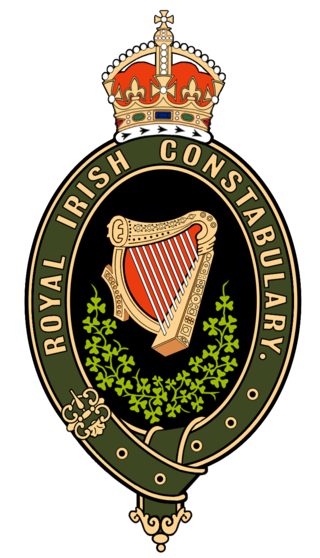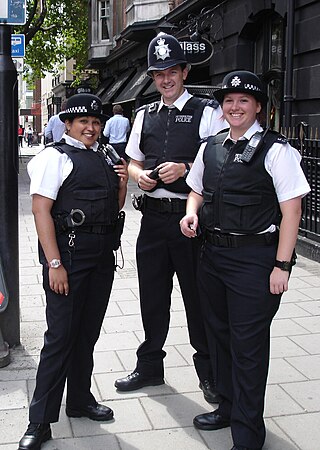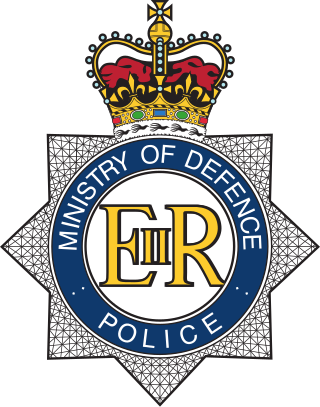
The Royal Ulster Constabulary (RUC) was the police force in Northern Ireland from 1922 to 2001. It was founded on 1 June 1922 as a successor to the Royal Irish Constabulary (RIC) following the partition of Ireland. At its peak the force had around 8,500 officers, with a further 4,500 who were members of the RUC Reserve.

The Royal Irish Constabulary was the police force in Ireland from 1822 until 1922, when all of the country was part of the United Kingdom. A separate civic police force, the unarmed Dublin Metropolitan Police (DMP), patrolled the capital and parts of County Wicklow, while the cities of Derry and Belfast, originally with their own police forces, later had special divisions within the RIC. For most of its history, the ethnic and religious makeup of the RIC broadly matched that of the Irish population, although Anglo-Irish Protestants were overrepresented among its senior officers.

The Police Service of Northern Ireland is the police force that serves Northern Ireland. It is the successor to the Royal Ulster Constabulary (RUC) after it was reformed and renamed in 2001 on the recommendation of the Patten Report.

Law enforcement in the United Kingdom is organised separately in each of the legal systems of the United Kingdom: England and Wales, Scotland, and Northern Ireland. Most law enforcement duties are carried out by those who hold the office of police constable and are employed by a territorial police force.
Chief constable is the rank used by the chief police officer of every territorial police force in the United Kingdom except for the City of London Police and the Metropolitan Police, as well as the chief officers of the three 'special' national police forces, the British Transport Police, Ministry of Defence Police, and Civil Nuclear Constabulary. The title is also held by the chief officers of the principal Crown Dependency police forces, the Isle of Man Constabulary, States of Guernsey Police Service, and States of Jersey Police. The title was also held, ex officio, by the president of the Association of Chief Police Officers under the Police Reform Act 2002. It was also the title of the chief officer of the Royal Parks Constabulary until this agency was disbanded in 2004.
Constabulary may have several definitions:
Police ranks are a system of hierarchical relationships in police organisations. The rank system defines authority and responsibility in a police organisation, and affects the culture within the police force. Usually, uniforms denote the bearer's rank by particular insignia affixed to the uniforms.

The Civil Nuclear Constabulary (CNC) is a special police force responsible for providing law enforcement and security at any relevant nuclear site and for security of nuclear materials in transit within the United Kingdom. The force has over 1,500 police officers and support staff. Officers within the force are authorised firearms officers, due to the nature of the industry the force protects.

An authorised firearms officer (AFO) is a British police officer who is authorised and trained to carry and use firearms. The designation is significant because most police officers in the United Kingdom do not routinely carry firearms. The only forces where officers are routinely armed are the Police Service of Northern Ireland, the Ministry of Defence Police, the Civil Nuclear Constabulary, Belfast Harbour Police and the Belfast International Airport Constabulary.

The Belfast Harbour Police is a small, specialised ports police force, with responsibility for the Port of Belfast, Northern Ireland. It was founded in 1847, making it the oldest continuously-operating law enforcement agency on the island of Ireland.

The Hampshire and Isle of Wight Constabulary is the territorial police force responsible for policing the counties of Hampshire and the Isle of Wight in South East England.

The Isle of Man Constabulary is the national police service of the Isle of Man, an island of 85,000 inhabitants, situated approximately equidistant from Northern Ireland, Wales, Scotland and England.
Police uniforms and equipment in the United Kingdom vary enormously per force or service, and different uniforms and equipment is used for different situations. Both what is worn and what is carried have varied considerably from the inception of the earliest recognisable mainstream police services in the early 19th century. As various laws in the mid-19th century standardised policing in the United Kingdom, so too were uniforms and equipment. From a variety of home grown uniforms, bicycles, swords and pistols the British police force evolved in look and equipment through the long coats and top hat, to the recognisable modern uniform of a white shirt, black tie, reflective jackets, body armour, and the battenburg-marked vehicles, to the present-day Airwave Solutions radios, electric vehicles and tasers.
This is a description of law enforcement in Northern Ireland and the Republic of Ireland. Before the Republic left the union in 1922, one police force — the Royal Irish Constabulary — policed almost the whole island.
In the United Kingdom police firearm policy varies by constituent countries. In Northern Ireland, all police officers carry firearms whereas in the rest of the United Kingdom, firearms are carried only by specially-trained firearms officers. The arming of police in Great Britain is a much debated topic.

The Ministry of Defence Police (MDP) is a civilian special police force which is part of the United Kingdom's Ministry of Defence. The MDP's primary responsibilities are to provide armed security and counter terrorism services to designated high-risk areas, as well as uniformed policing and limited investigative services to Ministry of Defence property, personnel, and installations throughout the United Kingdom. The MDP are not military police and should not be confused with the Royal Military Police or any other British Service Police. Service personnel often refer to the MDP by the nickname "MOD plod".










